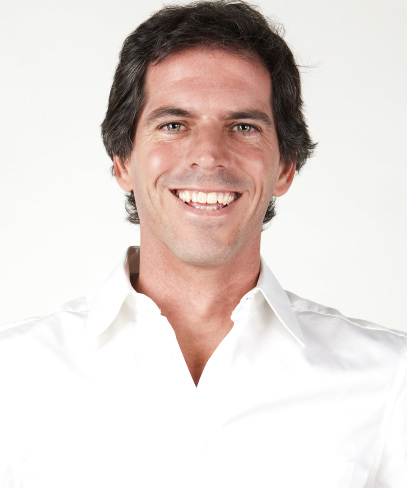Alec Oxenford isn’t a recognizable name in American business circles, but in South America, he’s a CEO rock star of sorts. At least, that’s what I’m inclined to believe, after experiencing the Alec Oxenford effect firsthand during a recent coffee meeting in New York.
在美国商界,亚力克o奥克森福德并不为人熟知,但在南美洲,他可是首席执行官中的明星。至少我是这么认为的——前不久,我有幸与他在纽约一起喝咖啡,亲身体会了一番他的影响力。
Partway through our meeting, a student in a hoodie approached our table and excitedly said, “Sorry to interrupt, but are you Alec Oxenford?”
在我们谈话的时候,一名身穿帽衫的学生来到我们的桌前,激动地问道:“冒昧打扰了,您就是亚力克o奥克森福德吧?”

The student, who was Brazilian, professed his admiration for Oxenford. He was a hopeful entrepreneur himself, studying at Columbia University. He said he recognized Oxenford from his Instagram account. Oxenford was embarrassed—he swore up and down that it wasn’t a set-up to impress me. His public relations person said that sort of thing happens fairly frequently in Argentina, where Oxenford is based.
这位来自巴西的学生表达了他对奥克森福德的仰慕之情。他就读于哥伦比亚大学(Columbia University),本身也有可能成为一名企业家。他说自己从Instagram账号上认出了奥克森福德。奥克森福德有些尴尬——他发誓这绝不是为了让我印象深刻而特意安排的。他的公关人员表示,在奥克森福德的祖国阿根廷,这类事情经常发生。
I had little choice but to believe him. Oxenford’s classifieds company, OLX, has quickly become a household name in emerging markets. This fall, OLX reached a milestone that puts it in the same category of Instagram, Facebook Messenger, and Snapchat: 200 million monthly active users.
我只能选择相信他。在新兴市场,奥克森福德的分类广告公司OLX已经迅速成为一个家喻户晓的名字。今年秋天,OLX抵达一项里程碑:月活跃用户达到2亿,这让该公司的影响力足以同Instagram、Facebook Messenger和Snapchat相提并论。
Founded in 2006, the company has grown to 1,200 employees and operates in 40 countries. With 11 billion page views, 25 million listings, and 8.5 million transactions per month, it is the largest marketplace in India, Poland, and, as of last year, Brazil. Funded by U.S. venture firms including Bessemer Ventures and General Catalyst Partners, OLX sold a majority stake to the African conglomerate Naspers in 2010. OLX is free to use and makes money selling promoted listings to users. (Payments are conducted offline, which has allowed OLX to avoid dealing with legacy payment infrastructure in each market it enters.)
OLX成立于2006年,如今拥有1,200名员工,业务范围拓展到了40个国家。公司每月拥有110亿次页面访问量、2,500万条广告,并产生850万笔交易,是印度和波兰的最大市场,从去年开始也成为巴西的最大市场。OLX获得了美国风投公司Bessemer Ventures和General Catalyst Partners等的资助,并在2010年将大部分股权卖给了非洲纳斯帕斯集团(Naspers)。OLX可免费使用,并通过向用户出售促销广告获取收入。(支付则通过线下进行。如此一来,OLX就不必在进入每个市场时都要考虑当地的支付系统问题。)
But OLX’s success is not the reason for Oxenford’s status among South American entrepreneurs. (Though his co-founder and co-CEO, FabriceGrinda, who left in 2012, is also well known in American tech startup circles as an angel investor.) Rather, Oxenford’s notoriety comes from his commanding personality—he will dominate a conversation—and staunch contrarianism, a point of view he shares with Peter Thiel, who has invested in OLX through his venture firm, Founders Fund.
但OLX的成功并非奥克森福德在南美企业家中获得显赫地位的原因。(尽管该公司的共同创始人兼联席首席执行官,后来在2012年离职的法布里斯o格林达同样以天使投资人的身份闻名于美国科技创投界。)实际上,让奥克森福德出名的是他的统治欲——他会主导和别人的谈话——以及他不走寻常路的行事风格。就特立独行这一点而言,他与彼得o泰尔可谓惺惺相惜,泰尔的风投公司Founders Fund便投资了OLX。
For example, OLX has taken the “Martian approach” to international expansion. Where most companies launch in their home countries because that’s what they understand best, OLX started with the biggest available market: India. The company didn’t launch anything in its home country, Argentina, until four and a half years later. American founders are “self-centered” for only focusing on the U.S. and developer markets, Oxenford says.
比如说,OLX采用了“火星式方法”进行国际扩张。大部分公司由于更熟悉自己的国家,都会选择本土扩张,但OLX却从最大的现成市场印度开始发展。公司在最早的四年半中,没有在祖国阿根廷开展任何项目。奥克森福德表示,美国的公司创始人往往“以自我为中心”,只关注美国本土和发达国家的市场。
“It’s rational to believe you know local markets,” he says, “but people are always the same in each country. They think the same way. They have different priorities, but they all want to progress in life and that’s what drives Internet behavior.” He believes OLX helps people progress in life by acting as a “wealth creator” in emerging markets, where users can easily monetize their possessions by selling them to each other.
他说:“认为自己更了解本土市场,这种想法很合理,但不同国家的人其实本质上是一样的,他们的想法很类似。每个人的生活重点不同,但都想在人生中取得进步,而这正是网络行为背后的驱动力。”他相信,通过在新兴市场扮演“财富创造者”的角色,OLX可以帮助人们在人生中取得进步。用户可以利用这一平台将自己的物品出售给其他人,从而换取金钱。
Oxenford’s other big contrarian play is to invest heavily in television advertising. Many successful startups don’t worry about marketing until their growth has hit a plateau, relying on cultural relevance, momentum, and public relations outreach in the early days. Startups that poured money into TV ads in the dot-com era concluded they didn’t work. That characterization has stuck. Oxenford says this is a mistake because there were so few Internet users in the dot-com era. Now, almost three billion people are online, many of whom skipped desktop Internet and went straight to mobile. Television ads directing them to a website or app actually work, he says.
奥克森福德另一项与众不同的举动是,大笔投资电视广告。许多成功的初创公司在成立初期会借助文化营销、增长造势和公共关系活动来做推广。在公司的增长遇到平台期之前,它们并不担心营销问题。那些曾经在网络热潮时期投资电视广告的初创公司得出的结论是,电视广告并不管用,而人们对电视广告的认识就停滞于此。奥克森福德称,这是一个误区,因为网络热潮时期的因特网用户其实太少了。时至今日,几乎有30亿人上网,其中许多人都不再使用台式电脑上网,而是用上了移动设备。他表示,如果用电视广告引导用户访问某个网站或使用某款应用,效果实际上相当不错。
OLX was profitable three years ago, but was only growing by 70% to 80% each year. Citing the potential for competition, Oxenford decided that slow, organic growth was actually more risky than fast-paced, advertising-fueled growth. “If people had understood what we were doing before, we would have had a lot more competition,” he says. So OLX sold itself to Naspers to fund faster, less profitable growth with TV advertising.
OLX在三年前开始盈利,但每年的利润增长率只有70%至80%。援引有可能出现的竞争压力,奥克森福德认为缓慢的内生成长实际上比广告推动的快速增长风险更大。他表示:“如果人们更早地弄清楚了我们的做法,我们可能已经遭遇了更多竞争。”所以OLX把自己卖给了Naspers,通过斥资做电视广告来推动业务更快速增长,尽管这样做会导致利润率有所下降。
Now, the company is in a position of strength in many of its markets, and its biggest three—India, Brazil and Poland—only make up 50% of user base. As Craigslist and eBay’s EBAY 0.25% lasting success have shown, it’s hard to disrupt a marketplace once it has liquidity. Which highlights another one of Oxenford’s contrarian decisions: he has no desire to compete in the U.S. or other developed countries. There’s too much opportunity elsewhere.
如今,公司在许多市场中都占据了强势位置,而其最大的三个市场——印度、巴西和波兰——只占公司50%的用户群。就如分类广告网站Craigslist和eBay的持续成功所证明的那样,一旦网上市场获得了流动性,它就很难被摧垮。这凸显了奥克森福德另一项逆向决定的英明:他对美国和其他发达国家不感兴趣,因为有太多的机会在别处。













